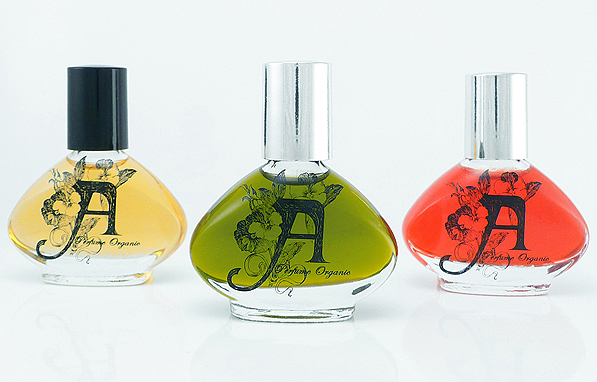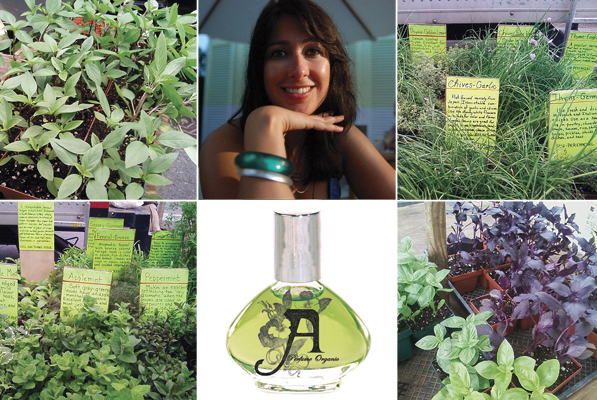
Between inhaling Green, Urban Organic, Perfumed Wine–Rosé and White Magik, Amanda Walker, owner of A Perfume Organic, gently touched the leaves of her fresh herbal display. She had purple basil, Italian basil and mint in a small pot next to her perfumes. Explaining the various herbs and floral notes that are part of each scent, she also talked about food, the business of being organic and the environment. The discussion inspired an idea of asking her to participate in an email interview to further explain the connection of herbs, food and scents. Her answers are insightful, beautiful and educational.

The story of “A Perfume Organic” starts with your Kindergarten experience, in which classmates where told, “I can smell in my mouth!” How would taste influence the creation of a perfume?
I realized the connection between smell and taste very early, and was constantly experimenting on myself. When making cookies with my sisters I would taste the spices, then smell them and was AMAZED by the difference. For example, the scent of cinnamon is oily, earthy, sweet, and nutty, the taste is bitter and dry. Texture has a lot to do with the taste experience, where scent deals with texture as depth and layers. My relationship with flavor preference, dining out, and my love of cooking has a direct impact on how I design and create perfume. My favorite food is black truffles, I put black truffle oil on EVERYTHING. When I’m feeling uninspired, I open my jar of truffle salt and inhale the sexy dirty aroma and am immediately overcome with wonder and curiosity at how fungus can affect me so deeply! I’ve always played around with non-traditional flavor and scent combinations like pepper in dark chocolate and walnut cookies… or cinnamon, and vanilla in pasta sauce! Layering food flavors in your mouth is just as satisfying as layering perfume scent on the body.
When we met at Georgia’s in SoHo, I noticed herbs were part of of the table top display for “A Perfume Organic”. What role do herbs play in the process of creating a perfume?
Herbs play a very important role in my perfumes because they are the ingredients! I wanted to design [a] natural scent that is healthy, luxurious, and truly smells like the herbs I rub at the farmer’s market. I’ve always respected traditional synthetic perfumes, but can only enjoy them in the bottle because they give me headaches, trigger my asthma and rudely linger too long. I also never understood why there was so much focus on only the blooms of plants, I love the leaves, roots and bark too! Lemon balm (Melissa) is an unbelievably fragrant herb–fruity, rich and incredibly rare because it takes so much to make a tiny amount of essential oil. There are so many more ingredients than just the few varieties of overused roses, jasmine and iris now mostly grown and farmed in China. I worked with a designer who grew only heirloom vegetables and herbs, and taught me about organic gardening. Working with the plants directly and personally instilled in me a respect and appreciation for the growers who are standing up to global corporations pushing genetic seeds, pesticides and ideologies from past generations that don’t benefit anyone but their own bank accounts and shareholders. Buying certified organic products directly supports organic agriculture, which DIRECTLY benefits the environment!
Has the process of becoming a USDA certified organic perfume affected your diet? If so, how?
I think my diet affected and inspired the idea of certifying the perfumes with the USDA! I’m very persnickety about where my food comes from, how and where it’s grown and processed, and who made my food (clothing and beauty products included!). I haven’t eaten animals for a very long time because I don’t want to support corporate farming and the horrible treatment of those animals. Everyday I look at my spoiled rotten Boston Terrier, Bean, and wish all animals could live the way she does. The act of eating, especially meat, is very destructive and violent. I am cognizant of the action of consumption and try not to contribute to flagrant waste, either of the food product or the packaging. So many resources go into food production, I’m hopeful we can return to the idea of quality instead of quantity and the cradle to cradle idea of reusable/multi-use packaging and containers, like my seed-embedded perfume boxes, can be planted, replenishing the flowers used to make my perfumes. Consumers need to simply start caring… it’s so easy to make a difference, money talks so support companies doing good things!
I’ve always played around with non-traditional flavor and scent combinations like pepper in dark chocolate and walnut cookies… or cinnamon, and vanilla in pasta sauce! Layering food flavors in your mouth is just as satisfying as layering perfume scent on the body.
Is a commercial/non-organic perfume different than an organic perfume? If so, how?
Most commercial perfumes are created from synthetic ingredients or natural ingredients treated with solvents like hexane (derivative of gasoline). These ingredients are very cheap and unhealthy. Everything seems to be ‘scented’ now, from garbage bags to toilet cleaner. The same chemicals used to scent these products are used and re-packaged as notes in fragrances for the latest ‘hit’ perfume. The chemical revolution took off after WWII when these ingredients started to be mass manufactured and widely used. I wanted to go back to the ways of the palace perfumers from the French courts, and the boutique, bespoke perfume houses. These perfumers traditionally used only naturally hydro-distilled materials, usually grown and processed personally or locally. The biggest difference is the way natural perfumes smell: synthetic perfumes overload the nose and force you to stop smelling, natural perfumes can be breathed in deeply, clear the sinus passages and don’t cause the negative effects like headaches and asthma. My perfumes are made from the finest, safest and rarest ingredients available, getting the richest scent from the plants from small distillers who are passionate about their craft and their impact on the environment.
The Perfumed Wine Trio is a new collection based on wine. A sommelier selects the notes of a wine in the creation of a perfume. What is the process of matching herbal and floral scents with the taste of wine? Would this process be similar or different to creating a few dishes to complete a meal?
I am OBSESSED with wine… specifically Rosé. I’ve pledged to try every Rosé on the market! When pairing natural perfume notes with wine, the Sommelier and I tasted 10 of our favorite organic Rosé wines and identified 50 different flavors and scents. We then chose from 75 natural perfume notes, the notes we thought would best represent the wines. Fresh berry, crisp apple, dark oaks, and rich spices blend beautifully. “Like the first sip from a chilled glass of Rosé, intrigue is imparted with hints of clove and nutmeg, warming into a peppery finish.” Wine is very similar to perfume because the quality is determined by the ingredients, how it’s processed, and how and where the ingredients are grown, the terroir.
The process was a bit different from creating dishes to complete a meal because wine/perfume are accessories to the main course (the wearer), they accentuate the experience, but can stand alone if desired. Wine is always better with fine cheese, olives, fruit and bread.
Visit A Perfume Organic’s website to learn more about organic perfume and to order online.
A special thank you to Amanda Walker.